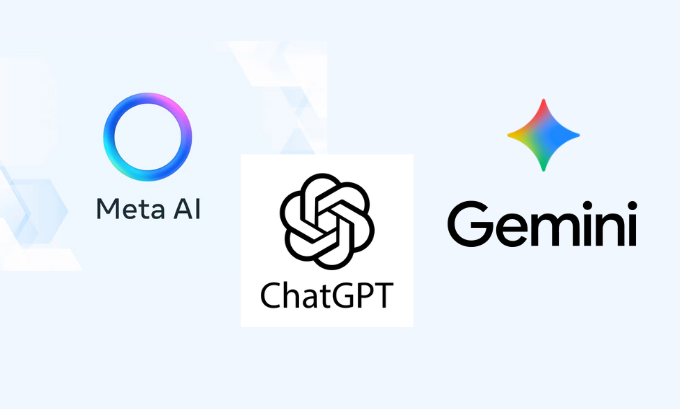If you’ve been on Facebook, Instagram, or WhatsApp lately, you’ve probably noticed a new search bar prompting you to “Ask Meta AI.” This isn’t just another feature; it’s the beginning of a fundamental shift in how we interact with social media. But what is Meta AI, really?
In short, Meta AI is a powerful, conversational artificial intelligence assistant integrated directly into Meta Platforms like Facebook, Instagram, and WhatsApp. Powered by Meta’s latest large language model, Llama 3, this tool is designed to answer your questions, generate images, brainstorm ideas, and help you get things done without ever leaving your favorite apps. To better prepare for the future of AI in social media marketing, exploring resources on how to work with artificial intelligence can provide a competitive edge.
This guide will break down what Meta AI is, how it’s changing the game for users and businesses, and why understanding tools like it is becoming essential. For those looking to master these skills, platforms like Simplilearn offer specialized programs, such as their AI and Machine Learning course in collaboration with Purdue University, to turn curiosity into a career.
Table of Contents
Unpacking Meta AI: What It Is and How It Works
Meta AI is a generative AI assistant developed by Meta Platforms. Think of it as a smart companion living inside your social apps. Unlike traditional search engines or chatbots, Meta AI can understand conversational language, generate creative content, and perform tasks based on your requests. It’s designed to be a seamless part of your daily digital life, whether you’re planning a trip with friends on WhatsApp or looking for recipe ideas on Instagram.
The technology powering this assistant is Llama 3, Meta’s state-of-the-art open-source large language model (LLM). This is what allows Meta AI to understand complex queries, generate human-like text, and even create high-quality images from simple prompts. By integrating this powerful model into its core products—Facebook, Instagram, WhatsApp, and Messenger—Meta is positioning AI not just as a tool, but as a foundational layer of the user experience. This integration signals a broader trend in AI for brand strategy, where intelligent assistants become key touchpoints.
A Personal Experience: Putting Meta AI to the Test
As a content creator, I’m always looking for ways to streamline my workflow. When Meta AI rolled out on Instagram, I was curious but skeptical. My goal was to create a week’s worth of content for a client’s travel-themed page. Usually, this involves hours of research, brainstorming, and writing.

I started by opening the Instagram search bar and typing: “Ask Meta AI to brainstorm 7 engaging post ideas for a travel page focused on eco-tourism in Costa Rica.”
Within seconds, it gave me a list:
- A post on “5 sustainable coffee farms to visit.”
- A carousel of “sloth sanctuaries you can support.”
- A Reel idea showing a “day in the life of a zip-lining guide.”
- And four more, equally solid concepts.
Impressed, I took it a step further. I asked, “@MetaAI, write a caption for the post about sloth sanctuaries, including 5 relevant hashtags.” Again, it delivered a well-written, engaging caption that only needed minor tweaks. The real magic happened when I prompted, “@MetaAI /imagine a vibrant, photorealistic image of a sloth hanging from a cecropia tree in the Costa Rican rainforest.” The image it generated was stunning and perfectly matched the aesthetic I needed.
What used to be a full day’s work was condensed into about an hour. It handled the research, initial drafting, and even the visual concepting, freeing me up to focus on strategy and community engagement.
What I Like About Meta AI
- Seamless Integration: It’s right there in the apps I use every day. There’s no need to switch between different tools for brainstorming, writing, and image creation.
- High-Quality Image Generation: The
/imaginefeature is surprisingly powerful, producing unique, high-resolution images that are great for social media content. - Speed and Efficiency: It dramatically cuts down the time spent on repetitive creative tasks, making it a powerful productivity booster.
- Conversational Nature: It understands context and follows conversational threads, making interactions feel more natural than with older chatbots.
Areas for Improvement
- Fact-Checking Is a Must: Like all LLMs, Meta AI can “hallucinate” or provide incorrect information. It once gave me details for a hotel that didn’t exist. You must verify any factual claims it makes.
- Limited Global Availability: Meta AI is still rolling out and isn’t available in all countries or languages, which limits its usefulness for global teams.
- Privacy Concerns: Since it’s integrated into platforms that hold vast amounts of personal data, users need to be mindful of what they share and understand Meta’s data usage policies. The growing concern around data protection is a key part of the cybersecurity trends for 2025.
Practical Applications: How to Use Meta AI for Business and Fun
Meta AI isn’t just a novelty; it’s a practical tool with a wide range of applications for everyday users, marketers, and business owners. From automating customer service to sparking creativity, its capabilities are already making an impact. As technology advances, staying informed through sources like TechBullion articles can help you keep up with the latest trends.

For Content Creation and Brainstorming
This is where Meta AI truly shines. Whether you’re a social media manager, a blogger, or just someone looking to spice up your Instagram feed, the assistant can be an invaluable creative partner.
- Generate Content Ideas: Stuck on what to post next? Ask Meta AI for ideas tailored to your niche. For example: “Give me 10 Reel ideas for a vegan baking channel.”
- Write Captions and Copy: Quickly draft engaging captions, ad copy, or even short blog posts. Prompt it with a specific tone and goal, like: “Write a witty Instagram caption for a picture of my cat sleeping on my laptop.”
- Find Hashtags: Improve your reach by asking for relevant and trending hashtags. “Suggest 10 popular hashtags for a post about minimalist home decor.” This ties into a broader content strategy to boost visibility.
- Create Custom Images: Use the
/imaginecommand to generate unique visuals, eliminating the need for generic stock photos. This is a game-changer for creating a distinct brand identity online, a core concept in AI in social media marketing.
For Customer Service Automation
For small businesses, managing customer inquiries across platforms like Facebook Messenger and WhatsApp can be overwhelming. Meta AI offers a solution by enabling customer service automation.
- Answering FAQs: Businesses can train the AI to handle frequently asked questions about business hours, shipping policies, or product details. This frees up human agents to focus on more complex issues.
- 24/7 Availability: An AI assistant doesn’t sleep. It can provide instant responses to customers at any time, improving satisfaction and reducing wait times.
- Streamlining Conversations: Meta AI can gather initial information from a customer before handing the conversation over to a human, making the support process more efficient. Businesses are increasingly looking for affordable accounting software for startups that can integrate with these customer service platforms.
For Personal Productivity and Planning
Meta AI can also function as a personal assistant to help you organize your life and get quick information.
- Trip Planning: “What are the top 5 vegetarian restaurants in Kyoto?” or “Create a 3-day itinerary for a trip to Lisbon.”
- Learning and Research: Get quick summaries of complex topics. “Explain the theory of relativity in simple terms.”
- Recommendations: “Suggest a good mystery novel to read this weekend” or “What movie should I watch tonight?”
For In-App Search and Discovery
Meta AI is transforming the search experience within Meta Platforms. Instead of just searching for keywords and getting a list of profiles or hashtags, you can ask conversational questions and get direct answers. This makes it easier to discover new content, communities, and products without leaving the app. For example, on Facebook, you could ask, “Show me groups for amateur photographers in my city,” and get a curated list. Understanding these evolving search mechanisms is crucial, much like understanding what meta tag in SEO is.
Meta AI vs. Competitors
| Feature | Meta AI (Llama 3) | ChatGPT (GPT-4) | Google Gemini |
|---|---|---|---|
| Integration | Deeply integrated into Facebook, Instagram, WhatsApp. | Standalone app and web interface; API for integration. | Integrated into Google Search, Workspace, and Android. |
| Primary Use Case | Social interaction, content creation, and in-app assistance. | General-purpose tasks, writing, coding, and analysis. | Search augmentation, productivity, and multi-modal tasks. |
| Image Generation | Real-time image generation within chats (/imagine). | DALL-E 3 integration, high-quality but separate flow. | Imagen 2, integrated but with varying availability. |
| Data Source | Real-time information from Bing search results. | Knowledge cutoff (unless browsing with Plus), but can browse. | Real-time access to Google’s search index. |
| Cost | Free (integrated into existing platforms). | Freemium model; paid “Plus” subscription for advanced features. | Freemium model; paid tiers for advanced capabilities. |
If you want to know more about the broader landscape of AI, you may visit sites like ponta.in, where topics like the role of AI at the Consumer Electronics Show 2025 are discussed. Such resources provide valuable context on how different technologies are converging.

The Future of AI Integration and Why You Need to Upskill Now
The launch of Meta AI isn’t just another feature update; it represents a major milestone in the integration of generative AI into our daily lives. As AI becomes the connective tissue of our digital experiences, the demand for professionals who can leverage these tools will only grow. Staying ahead of these cybersecurity trends 2025 is becoming crucial for career longevity.
For marketers, AI assistants like Meta AI are becoming essential for developing a modern meta marketing strategy. The ability to quickly generate content, analyze trends, and automate interactions provides a significant competitive advantage. Businesses that fail to adapt risk being left behind. Exploring the best AI tools 2025 is a great starting point for any professional.
This trend also has profound implications for career development. Understanding how large language models work, how to craft effective prompts, and how to integrate AI into business processes are no longer niche skills. They are becoming fundamental literacies for the modern workforce. This is why educational platforms like Simplilearn are seeing a surge in interest for their AI and machine learning programs.
Simplilearn offers a range of courses designed to equip learners with the practical skills needed to thrive in an AI-driven world. Their Post Graduate Program in AI and Machine Learning, offered in partnership with Purdue University, provides a comprehensive curriculum covering everything from generative AI to deep learning. Investing in such programs is not just about learning a new tool; it’s about preparing for the future of work. Professionals looking to advance their careers should also consider the best coding courses to build a strong technical foundation.
Frequently Asked Questions (FAQ)
1. What is Meta AI?
Meta AI is a conversational artificial intelligence assistant integrated across Meta’s apps, including WhatsApp, Instagram, Facebook, and Messenger. It’s powered by the Llama 3 language model and can answer questions, generate text and images, and help with tasks.
2. What is Meta AI in WhatsApp?
In WhatsApp, Meta AI allows you to ask questions, create images, and get information directly within your chats. You can access it in group chats by typing “@MetaAI” or through a dedicated shortcut, making it a powerful tool for planning and brainstorming with friends.
3. Is Meta AI free to use?
Yes, Meta AI is currently free to use. It is integrated into the existing Meta apps without an additional subscription fee. This is a key differentiator from other AI assistants that operate on a freemium model.
4. What is Llama 3?
Llama 3 is the open-source large language model developed by Meta that powers Meta AI. It’s known for its advanced reasoning, language understanding, and code generation capabilities, making it one of the most powerful models available today.
5. How is Meta AI different from what is meta in HTML?
These concepts are completely unrelated. Meta AI is an artificial intelligence assistant. In contrast, HTML meta tags (like what is meta tags) are snippets of code that provide metadata about a web page to search engines and browsers. They are crucial for SEO but have no connection to conversational AI. Similarly, concepts like what is meta data in dbms or what is a meta search engine relate to data and search technology, not generative AI assistants.
6. Can Meta AI be used for business?
Absolutely. Businesses are using Meta AI for content creation and brainstorming, generating marketing copy, and customer service automation. Its ability to quickly create content and answer FAQs makes it a valuable tool for small businesses and marketers.
7. How does Meta AI handle privacy?
Meta has stated that personal conversations with Meta AI are not used to train the public models and that they are taking steps to ensure user privacy. However, users should remain cautious and review Meta’s privacy policies to understand how their data is used, especially since this is an area of growing concern for cybersecurity trends 2025.
Your Gateway to Mastering AI
The integration of tools like Meta AI across the world’s largest social platforms is a clear signal: AI is no longer on the horizon; it’s here. Understanding what is Meta AI and how to use it is the first step toward harnessing the power of generative AI. For those who want to go from user to expert, the path is clear: education.
Investing in a high-quality program, such as Simplilearn’s AI and Machine Learning courses, can provide the structured knowledge and hands-on experience needed to build a successful career in this exciting field. Don’t just watch the future unfold—build it.
About the Author
This article was written by a team of technology experts and content strategists with deep knowledge of the AI and machine learning landscape. With years of experience analyzing emerging technologies, our goal is to provide clear, accurate, and insightful content that empowers readers to navigate the complexities of the digital world. Our work is grounded in extensive research and a commitment to trustworthiness.

